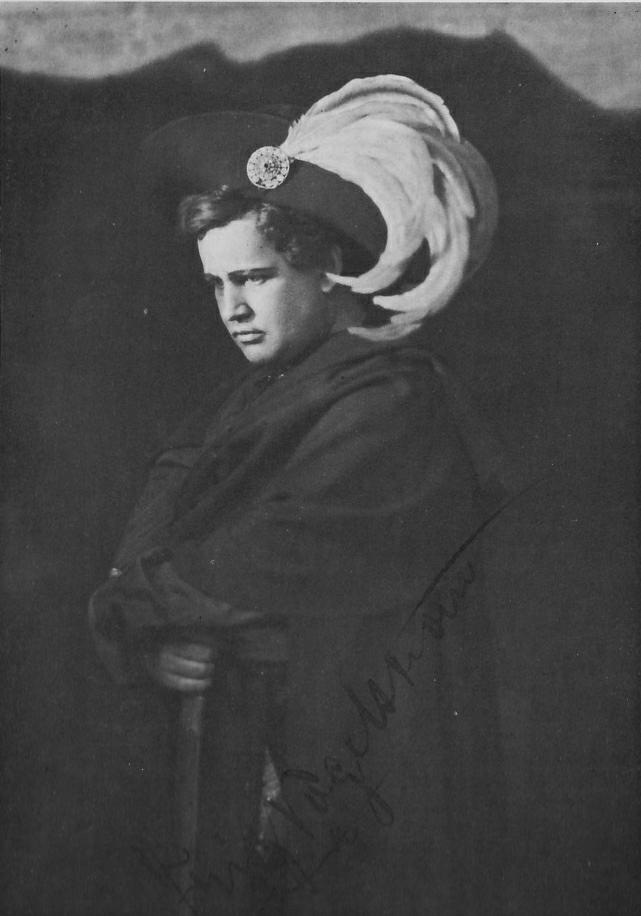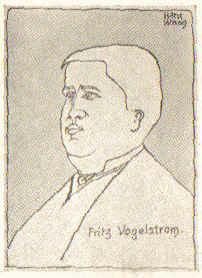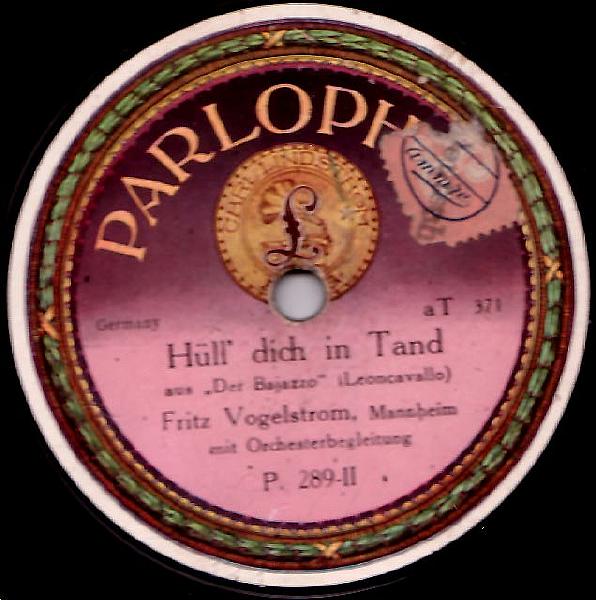Vogelstrom was born on November 4th, 1882 in Herford. He undertook is first small part at
the age of 14 in Robert und Bertram (play with incidental music by Gustav Raeder) as "Schildwache" at the Herforder Stadttheater. In 1898,
Vogelstrom joined a male quartet "Sänger von Finsterwalde". When
performing with the group, he was heard by the director of the Hamburg opera who proposed
him a contract. However, Vogelstrom was drafted at that time and instead of going to
Hamburg, he went to Hannover. Vogelstrom had an accident and was released from
service. He joined another quartet "Rheinisches Männerquartett" in Mannheim. The
director of the Mannheim opera, August Bassermann, heard him and asked him to audition.
His audition was on November 23rd, 1903 and as a result, he got a five year contract. His first parts in
Mannheim were Max, Tamino, Alessandro Stradella and the Seaman (Tristan und
Isolde).The number one heldentenor of the Mannheim Opera Friedrich Carlén died, and
that was Vogelstrom's big break. He added Lohengrin, Stolzing,
Siegfried, Tristan to his repertory. For his last performance in
Mannhein, Vogelstrom choosed Pedro.
In 1912, Vogelstrom went on to Dresden. He was warmly welcomed in Dresden because their three
heldentenors Burian, von Bary and Sembach where not able to sing for different reasons.
He made his debut in Dresden as Max. There, Vogelstrom added Bacchus,
Hans Kraft (Bärenhäuter), Kaiser, Gomella (Sonnenflammen) and a part in Hand
und Herz to his repertory. He also added Tannhäuser, Parsifal, Canio and Turiddu (on the same evening, where he
received 42 curtain calls), Herodes, Rienzi,..etc.
Vogelstrom made many guest appearances, for example:
1908, he was in Dresden for the first time, before becoming a member of the troupe, replacing Burian in
Tiefland, followed by Carmen and La bohème.
1909, Vogelstrom made his debut in Bayreuth as Froh on July 25th. He was supposed to sing
Lohengrin, but intrigues behind the scene, by the wife of Bary, made sure he did not
appear. However, Vogelstrom appeared as Parsifal on July 31st and August 8th. The same year, he
also sang in Vienna.
1910 Berlin (Stolzing), 1911 Nürnberg (Stolzing), München (Stolzing), Essen
(Lohengrin)
1912 Essen
1913 Hannover (Lohengrin), Bielefeld (Lohengrin), Nürnberg (Siegfried)
1922 Zoppot (Siegfried)
Vogelstrom continued to sing in Dresden until 1928. He died on December 25th, 1963 in
Köthen, after having lost all his properties in the bombing of Dresden where he
lived during the war.
Vogelstrom recorded for Gramophon, Odeon, Pathé, Vox, Homocord and Parlophon: a total of 125 sides.
Vogelstrom was at the center of a bizarre and disgusting affair at the (and after the) end of his career.
In a Salome performance in 1928, he had an accident, was severly injured and took many months to recover. The management of the Dresden opera (Fritz
Busch was the director) seized the opportunity and pensioned him – "for his unflinching attitude", Vogelstrom had been "a
thorn in the flesh" of Busch, anyway. If it's notoriously right-wing Einhard Luther who wrote that (on a Preiser LP cover), I'm
already wary which kind of "attitude" that may have been. In the light of the ensuing events, even more so: Vogelstrom went to
court about the question of fault for the stage accident, the press eagerly reported – and the emerging National Socialist
Party advocated strongly for Vogelstrom. Fritz Busch was their sworn enemy (one of the few Germans who had read, and apprehended,
"Mein Kampf" long before Hitler came to power) and thus one of their primary hate objects, and Vogelstrom provided them with an
opportunity to target him. They even put the case on the agenda of the Saxon state parliament (22 January 1929).
When they came to power in 1933, one of their first cultural policy actions was to oust Fritz Busch from office (he was clever,
courageous and ethical enough to leave not only the Dresden opera theater, but Germany, and went into voluntary exile). Vogelstrom was
soon invited to return to the Dresden opera, but only for a guest performance as Parsifal. Nobody really thought of hiring him
again; the Nazis had no use for veteran singers with worn-out voices, they had just needed the man with the "unflinching
attitude" for their agitation.
Excerpts from Vogelstrom's repertory
Der Freischütz, Die Zauberflöte, Alessandro Stradella,
Tristan und Isolde, Lohengrin, Die Meistersinger von Nürnberg,
Götterdämmerung, Ariadne auf Naxos,
Der Bärenhäuter (by Siegfried Wagner), Die Frau ohne Schatten,
Sonnenflammen (by Siegfried Wagner), Hand und Herz (by Striegler),
La muette de Portici, Siegfried, Parsifal, Pagliacci, La Juive,
Cavalleria rusticana, Salome, Rienzi, Tiefland, Carmen, La bohème,
Das Rheingold, etc.
Reference: Stimmen, die um die Welt gingen, June 1992


